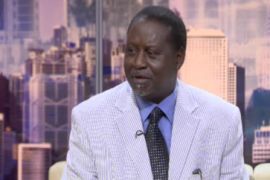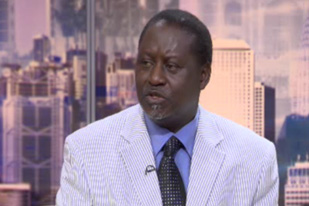
Raila Odinga 04 May 2007
Sir David Frost talks to the Kenyan presidential candidate about corruption in his country.
 |
| Raila Odinga on Frost Over The World |
Sir David Frost: Kenya has seen more than its fair share of corruption and nepotism scandals since gaining independence. But this year sees the presidential elections come around for Kenya, and along with them the hope that they might bring about a turning point in the future of the country. But is the country and its opposition capable of uniting for change, or can we expect more of the same from whoever should win the presidency? Well here to discuss this with me is the Honourable Raila Odinga, who launches his presidential bid this weekend.
Sir Jeremy Mattan from the University of Tasmania described you as a brave individual who has continued to struggle at considerable personal cost to turn Kenya into a multi-party democracy. How is that struggle going?
Raila Odinga: Well the struggle continues, because as you know it is a process to bring about change, and it is not like instant coffee that you brew and drink at the same time. It has taken a long time, but we are on the march towards realisation of the Kenyan dream.
DF: And how much time, in this battle for the Kenyan dream, have you had to spend in prison?
RO: I have been in prison three times for a total of eight and a half years, as a detention without trial. In other words I was never trialled and convicted.
DF: Never trialled, never convicted?
RO: Never.
DF: Were you tortured?
RO: Of course there used to be a lot of torture, both physical and psychological. Physical sometimes when they arrested you they subject you to a lot of beatings. Psychological in the sense that it was solitary confinement. You were completely alone and incommunicado. Correspondences are very rare; sometimes letters take as long as six months to arrive. And no access to any kind of information from the outside world.
DF: So in a situation like that what do you do all day? Did they give you books to read or nothing to do?
RO: Initially they only give you the Bible and the Qur’an if you ask for it. Those are the two materials that you have, until later when they relax it and allow your family to send you some reading materials. And they can also give you some materials from the prison library.
DF: Tell me something, why is it that we see in Kenya and the story of Kenya since independence so much corruption? Why is it and how would you deal with that?
RO: Well you see the corruption in Kenya is systemic. In other words it is corruption that has been tolerated by the state. Its origin started when they set up a commission, called [Endegwa] Commission, which recommended allowing the civil servants to engage in businesses. So the senior civil servants formed their own companies, which were then dealing with government, trading with government and this created a conflict of interest. That is the origin of this mega-corruption.
Then of course along with it there is petty corruption, which comes as a result of the deterioration in the living standards and the cost of living. And then if unchecked of course it also spreads and becomes very big. So both petty and mega-corruption live side by side in Kenya because it has been tolerated by the state.
DF: I see and in fact they say that because of the corruption in Kenya foreign office minister Kim Howells said that the East African nations’ porous borders mean groups such as al-Qaeda see it as being wide open. Is that a danger? Has that happened too that al-Qaeda see that because the corruption and so on that they can smuggle more drugs and so on?
RO: Yes, because of the corruption Kenya is now designated as one of the major transit points for drugs in the world, because the security enforcement agents themselves are corrupt. And as a result of this there’s a lot of porosity in borders and law enforcement agencies. So you find that a number of criminals, drug pushers, people who are doing money laundering and so on have an easy way of going through Kenya.
DF: And if you win this election do you think you can stop this, stop the drug pushers, stop the criminals, stop the corruption? It is a big task for one man.
RO: Certainly yes it is. I know the task is big and I don’t underrate it, but I think that we can deal with it by creating a team; it is not an individual. I think that I can create an effective team that can deal with this, and create institutions that will help to fight this corruption and restore moral order in our country. I think that Kenyans themselves actually are against corruption. Kenyans would like to lead a normal life and would like to see clean government. And this is what I am promising in my vision.
DF: And one last vital question, are you going to win?
RO: I believe that if you go into a contest knowing that you are going to lose you have no business going into the contest in the first place. So I am going into this contest fully confident that I am going to win. But I will say that in the event, or in the unlikely event that I lose, I shall support whoever will win the contest.
This episode of Frost Over The World aired on 04 May 2007
To contact us click on ‘Send your feedback’ at the top of the page